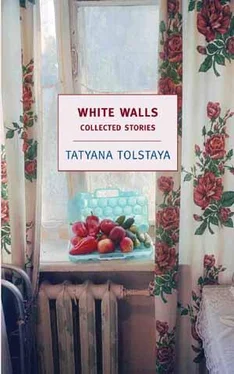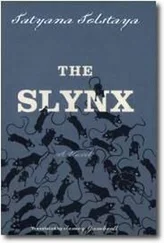Maybe there actually was a certain someone in another city… but who cares, what does it matter if nothing came of it, and now, after so many years, I’ll sit alone and drink a glass of rowanberry cordial to the memory of Judy’s soul, and I’ll look into the candle’s flame for a long time, and won’t see anything in it except a shining petal with a white core, except for emptiness burning in emptiness.
Farewell, Judy, I’ll say to her, you’re not the only one who didn’t make it. I’m done for, too, all the beasts of my breed have scattered to the four winds—they’ve gone beyond the green waters of the Lethe, beyond the glass wall of the ocean, which won’t part to allow passage; those who didn’t pay close attention were shot and wounded, the hunters had a glorious hunt, their mustaches are bloody, and fresh feathers have stuck to their teeth; and the ones who bounded off in all directions in the desperate hope of surviving hastily changed into alien clothes, adjusted their horns and tails in shards of mirror, pulled on gloves with claws, and now you can’t tear off the dead, fake fur. I run into them sometimes, and we look at each other turbidly, as if from underwater, and I should probably say something, but there’s no point in talking. It’s like when someone is seeing you off on a trip and you stand inside the train car behind the unwashed double glass, and he stands on the platform in gusts of night rain, and you’re both smiling tensely; everything has already been said, but you can’t leave, and you nod and draw waves on your palm: “write,” and he nods too: I get it, got it, I’ll write. But he won’t write, and you both know this, and the train keeps standing there, it won’t budge, none of it will start—the jolts of movement, the sheets, the rubles, the neighbors’ chatter, the dark, sickly sweet tea and oiled paper, the dull flash of lampposts on an empty railway platform, the blazing, beaded gold of raindrops in dotted lines on the glass, the sinful, sidelong glance of a soldier, the swaying crush of bodies in the corridor, the shameless cold of the John where the rumble of the wheels is stronger and more demeaning, and your own reflection stares at you from the murky half-dark, close and unflattering, your own reflection—humiliation—destruction… But this is all to come: right now the train is still standing and hasn’t moved, and your smile is strained and ready to slip, to drift into a tear; and in anticipation of the jolt, the end, the last wave of the hand, you move your lips, whispering senseless words; eighty-seven, seventy-eight; seventy-eight, eighty-seven—and on the other side of this deafness he also moves his lips and lies with relief: “Definitely.”
It was then that Spiridonov, who had ruined his teeth on cheap crackers and the damaging effects of the hot water he drank every evening, was obliged to order himself new crowns. The scatterbrained invalid supposed that he was having gold ones put in, but his very mouth was ripped off for a pretty sum as it turned out later. However, the variety of metals in his middle-aged mouth created a rare but marvelous effect: Spiridonov himself began to receive radio broadcasts without any supplementary appliances. Soft tangos floated out from him, distant foreign voices and prayers, soccer matches howled, raging who knows where. He usually worked on shortwave and turned on in the evenings. In the early hours he transmitted all kinds of rubbish, “For all you inquisitive people out there,” or a concert of machine operators’ requests, but the thicker the darkness grew, the more mysteriously the world muttered and laughed, and lights escaped from the gloom, and there were colored lanterns and drums… and water ran somewhere, full of lights. What kind of water and what kind of lights, and what the drums were saying—how could we possibly know?… And at midnight the invalid broadcast in Portuguese, I think. Maybe it wasn’t Portuguese, how would we know? But oh, what a beautiful language! A taut, flat ocean rhythmically beat at the shore in a wave as long as a whip, colorful sails entered the harbor, and stone steps descended to the water, and there was the smell of seashells and boiled rice, and under red roofs stern women sang loudly of flowers, murders, vessels freighted with burlap and lacquered boxes, birds and beads, purple silk and fragrant pepper. Perhaps it wasn’t like that at all—but how could we possibly know if we had never seen it and would never, never, never see it—never, to our dying day, to the squeak of the cheap, painted coffin of wet pine slabs lowered on a hairy rope in jolts, spurts, and last earthly lengths into the sandy autumn soil, loam, red earth… to the last aster, the royal flower, stamped into the November earth, its head bitten off by the heel of a purple-faced, hurried grave-digger? Never, never, sang Spiridonov; never, I sobbed; never, shouted Lyonechka. Time has stopped, space has dried up, people have hidden in the cracks, the domes have rusted, and the fences are wrapped round with bindweed; you yell—and can’t be heard, you look—and can’t lift your sleepy eyelids, there’s dust as high as the clouds, and Pushkin’s grave is grown over with thick goosefoot! cried Lyonechka. O’er summer’s thickened goosefoot dragon-geese go flocking by. Like beasts at first they’ll howl, or stamp their feathery feet and cry. A lonely maid is frightened—bearded dragon-geese fly by, Is that you Ivan Susanin? See me home, dear, or I’ll cry. To our plans there are no limits, the whole nation reaches high; blackened crabs have picked the flesh off of a dead and bloated thigh. Peter’s pinching peppered pickles, pinching pecks of parsnips too; slews of Slavs have sharpened sickles, but can’t figure what to do. Beyond the gates the cold winds blow—the nightingale its teeth has bared; the fiend, sweet home’s ferocious foe, refuses to be spared! The night bird croaks upon his bough, beneath him breaks the cradle slim; and cock-a-doodle-do bewails aloud the six-winged seraphim. God’s little birdie knows no mercy—neither knows he shame; he’ll tear your heart out, eat it whole, and gaily seek his fame. Midst foggy mist a string resounds—the road is all in dust; if life should e’er deceive you, then it’s homeward that you must.
But Spiridonov, deaf to Lyonechka’s decadent poetry, dreamed his own dreams, and his plans were grandiose: some sort of antennas, amplifiers, coils of wire, radio vacuum tubes, musical light shows. Ha! What light shows; he already planned to wire entire imaginary dance halls and stadiums for sound; he fantasized television images, festivals, cross-country friendship races, the investiture of Olympic medals, the erection of congratulatory statues in the motherland—marble to the neck, bronze to the nipple, a full five stories of granite with sword in hand; he was already razing mountains and excavating tunnels, damming rivers, and redrawing the borders of republics, he was already traveling into outer space and from there, his fake gold caps twinkling, his telescopic eyes rolling, huge as King Kong, he would knock down ballistic missiles and establish eternal peace throughout the whole world.
And there was still no Pushkin.
Then the vigilant comrades from the house management committee visited the apartment, led by old man Dushkin, who, if he slipped on the street or the sour cream had turned, never wrote to any less an authority than the Politburo. The comrades wanted to know: Why all the noise and music, and why did the lights burn at night? Your documents, please. Spiridonov took the blame on himself: he was an inventor, he worked at night, the sounds of the zurna and drums stimulated him. He brought out his eighth-grade achievement certificate from boy’s school #415 of the Red Guard region, a publication from Science and Life, “ MAKE a handy new MOP from old TOOTHBRUSHES,” and a museum curio: the text of Lenin’s “How We Should Reorganize the Worker-Peasant Inspectorate,” reproduced in encrusted fish bones on a walrus tusk by an unknown folk master. If it’s not allowed, said Spiridonov, then he wouldn’t do it anymore, but his documents were in order, we know the residence rules. We, thank God, aren’t children, we know that everything’s forbidden: we mustn’t stand at night on the side of the Moscow Ring Road, operate without support, pull except in case of emergency, lean over the driver’s cabin, take more than six hundred grams per person, tamper with the packaging, bring a bottle for consumption on the premises, place objects on the handrails, peddle without a license, open before coming to a complete stop, walk without a muzzle, transport foul-smelling, poisonous, or oversized items, talk more than three minutes, descend and walk along the rails, stick our heads out, climb up, photograph, offer resistance, croak, whistle, shout thrice in the dawn like a basilisk, or engage in the sawing of firewood after eleven o’clock at night local time.
Читать дальше












